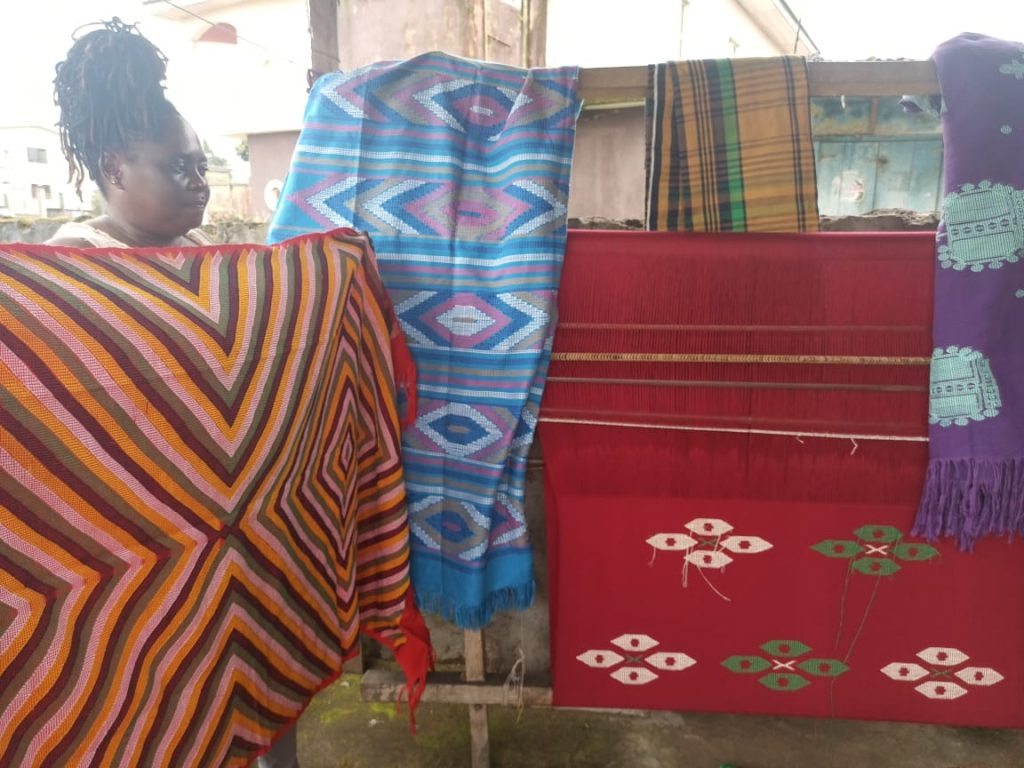By Stephen Ukandu
In this special report, Stephen Ukandu, traveled to the oil-bearing Ukwa East in Abia State to x-ray the ingenuity of Akwete women in weaving the popular local fabrics called Akwete Cloth. In trying to unravel how the craft has survived for centuries despite lack of government support, he was confronted with a big myth surrounding the craft.
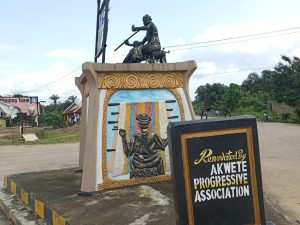
Akwete is an ancient town in Ndoki clan of Ukwa East Local Government Area of Abia State. With a population of about 10,000 people, Akwete currently has three autonomous communities – Umueze, Umuihueze, and Amakam.
Sandwiched between Obehie and Ohanso, Akwete takes about 50 minutes drive from Aba, the economic nerve centre of Abia State. But due to the deplorable condition of the Port Harcourt-Obehie-Obohia-Azumini-Akwa Ibom Road that passed through the ancient town, it takes about two hours to get to Akwete from Aba as at October 2023.
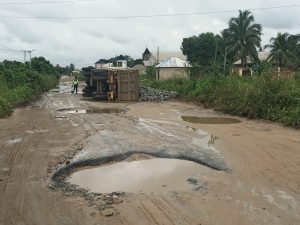
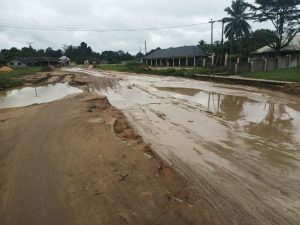
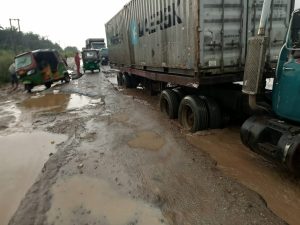
Apart from poor access roads, the ancient town has been without public power supply for the past 10 years according to locals. No thanks to vandals who carted away electricity transformers and other electricity installations in the area.
The town located about 40 kilometers to Port Harcourt, Rivers State, is also an agrarian community. The people produce cassava, plantains and palm oil in large quantities. Their male folk also engage in fishing and trading.
Despite the various challenges especially the infrastructural deficit that the people of Akwete grapple with, just like other communities in the South-East zone, Akwete women have remained resilient in their weaving craft. In fact, Akwete cloth has become a global brand.
A trip by Ikengaonline Reporter to Akwete, although very torturous due to bad road, was very revealing. It was a cloudy morning and the journey intermittently disrupted by light showers. But after about two hours from Opobo Junction Ogbor Hill, Aba, our Reporter was at Akwete.
He had picked a bike from Azumini the terminal point of the tricycle which he boarded at Opobo Junction Aba. The nightmarish nature of the road has made tricycles and motorcycles the only convenient means of transportation to the town.

Findings revealed that virtually every household in Akwete has a loom where the local fabric is weaved. Curiously too, weaving of Akwete cloth is an exclusive preserve of the female folk. According to multiple local sources, cloth weaving is a taboo for the men in Akwete
Historical perspective
The genesis of weaving craft in Akwete has no precise date but various accounts point towards late 18th and early 19th century. Yet some believe it was before the arrival of the Portuguese.
Although there is lack of exact date when this unique craft originated in the ancient town, one name, Madam Dada Nwakata, stood out by various local sources as the heroine of weaving craft in Akwete land.
According to history, Madam Dada Nwakata introduced the distinctive designs which has given many Akwete fabrics their unique identify. She was said to have got the revelation in the dream, and later, created these designs in secret so as to prevent others from copying her inventions. It was also said that when she left her loom which she used in weaving the fabrics, she cast spells on it to scare the prying eyes of others.
Legend has it that Dada Nwakata was the first to start weaving with silk and cotton threads.
This historical narrative was corroborated by a former Chairman of Ukwa East LGA, and a member of the Eze in Council of Amakam Autonomous Community, Chief Okere Eruba. Eruba who later read Textile Design in Germany specialising in weaving is currently the representative of the Royal cabinet following the demise of the traditional ruler, HRM Roland Asobie, whose second burial is yet to be conducted as at the time of the visit.
“Akwete cloth weaving started with a woman known as Dada Nwakata. She got the vision in a dream and started using raffia to make her yarn,” Eruba said.
According to him, this must have started before the arrival of the Portuguese “because when the Portuguese arrived Eastern Nigeria, they discovered that the people were already clothed.
“Akwete cloth, he continued, started with a small piece just wide enough to cover the nakedness of a man. The size has been increasing since then.”
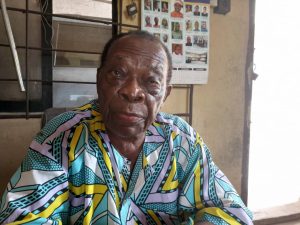
Visit to Madam Dada Nwakata’s monument:
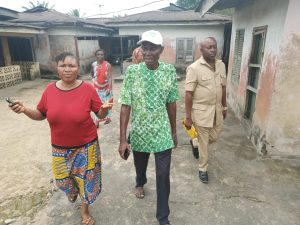
In the company of a tour guard, Engr. Felix Nwagbara from the neighbouring Ohanso Community, our Reporter visited Umumai village where Dada Nwakata hailed from. They were led by Mr Graham Abonta from the community.
On arrival they met Mr John Chukwuemeka, a kinsman of the late Nwakata; Mrs Ekwutos Jinna, married from Imo State; and Mrs Chioma Glory John. They showed them the grave of the late heroine located inside the compound, beside a small bungalow. Her direct descendants were said to be residing outside the town.
Confirming the earlier accounts about her role in the evolution of Akwete cloth, Madam Glory said there was a special design named after Dada Nwakata in order to immortalise her.
The 53-year old who later took us to her own loom in a nearby compound, said she was fulfilled weaving Akwete cloth. It has been her main source of income from childhood, and she has supported her husband with the accruals.
“I started weaving at the age of nine, and I’m happy doing it till today. I can produce four pieces (i.e 12 yards) in a month. According to her, a piece of Akwete cloth (3 yards) depending on the material and the sophistication of design, sells between N30,000 and N70,000. Some special designs could sell for as high as N150, 000.”
She displayed different designs of the local fabrics made for different occasions and for different classes of customers.These include: Ikaki (tortoise) design; Crown (for royalty); Enyi kwo nwa (elephant) design; Fancy block; Ijeagwo (snake movement) design; Atu okonko for masquerades and cultural activities, among others.
Akwete cloth has so many other beautiful designs such as Kente, nnadede, ebe, okwu epele, nkpuru nebe (coat of arm), popo, george, ukwu bench, aziza (broom), npekene afere (broken plate), ufere mmiri, ikpere ndioma, etc.
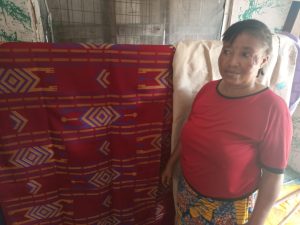
Another weaver with her private loom in her house, Mrs Edith Brown, 55, told Ikengaonline that she had been into the craft from her childhood. The mother of three also confirmed earlier accounts that it takes one person about one week to produce a piece (3 yards) of Akwete cloth depending on the design.
The major raw material for weaving Akwete cloth is thread of various colours that give it the desirable designs.
Asked of her major challenges in the craft, she said: “high cost of thread” due to the soaring exchange rate of the Naira to a Dollar. According to her, since the administration of the immediate-past President Muhammadu Buhari, weaving has not been so lucrative due to the ever-increasing cost of materials.
Nonetheless, she said that with a soft loan of about N500,000 to amass thread which is the key raw material for the fabric, she would be a happier weaver. On whether such financial assistance could make her employ more hands, her response was somewhat shocking.
“No! But I can give to other women to help me produce if I get more orders. It’s our culture; we don’t show it to others except females from our place or those married into our place.”
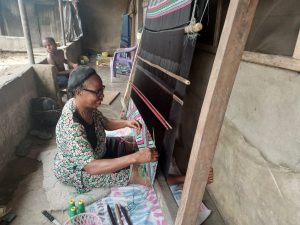
Unsung heroes weaving together the fabrics of family and social morality
Ikengaonline visited another woman who also had a private loom in her house, Mrs Confidence Ezihe. The 45-year old and mother of three is a graduate of Political Science from Enugu State University.
She said she was fulfilled weaving Akwete cloth as it gives her more money than she would have made, perhaps being a civil servant. According to her, she nets about N160,000 per month depending on the placement order she got from her customers.
Madam Confidence said she was satisfied weaving Akwete cloth.
“I’m very happy any time I sit to weave,” she smilingly responded to an inquiry while her hands were very busy on the loom as she carried on with the craft of her childhood.
She also confirmed that weaving in Akwete is a no-go-area for the male folk.
“It’s only women and girls that weave in our land; men don’t get involved. That’s how we met it!”
On the percentage of women involved in the craft she said: ” Virtually all the women in Akwete are involved in weaving. We learn it from childhood – as early as six, seven years. Every woman in the village has her own loom. If you visit every home you will see people weaving in their private looms.”
She further admitted that weaving has positively impacted the women fold in Akwete land as the craft has helped to keep them focused. According to her, girls from the community return home during holidays to make some fortunes ahead of the next school resumption. She also said that the women had been very supportive to their families through income from the craft.
“Weaving has made tremendous impact on our women and girls. You can hardly get any girl messing around here because everybody is busy. Most people that are educated in our community achieved that through weaving. I’m a typical example!
“Even when I was in school, this was what I used in training myself. Virtually everybody is into it. During holidays, we all come home, buy materials and start weaving to get some money before school resumes. We sell off the products and use the proceeds to support ourselves back to school.”
On how long it takes to acquire the skill, she said “it depends on individual’s learning ability. If the person is from Akwete community, it won’t take her long but if she is married from outside, it may take her longer time.”
She further explained that a learner would begin with how to roll the thread called “mkpuru” in the local dialect, before attempting to weave.
Responding to an inquiry on what she considered the major obstacles of the craft, she also cited the high cost of materials as well as poor access roads to Aba where they source the materials.
“The materials we use are very costly now because they are all imported. We, also don’t have good roads to Aba where we buy them. We want government to come to our aid. This is Ukwa land the only oil producing clan in Abia State but our roads are like highways to hell,” she agonised.
On why Akwete cloth must not be produced outside Akwete soil, she said: “That’s what we came to see. It’s called Akwete cloth!
She said orders are placed by customers from far and near including the diaspora Igbo community. According to her, when anyone gets orders depending on the
quantity and time frame, she extends to other women to help her meet up. If It’s a bulky order, the co-operative centre with more hands could be involved.
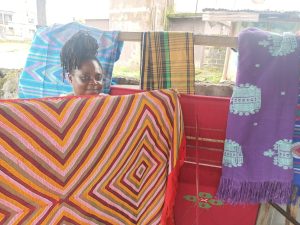
When Ikengaonline visited the Akwete Women Co-operative Society, alas it was on a Monday! The unending sit-at-home protests over the continued detention of the Leader of the Indigenous People of Biafra, IPOB, Mazi Nnamdi Kanu, has affected virtually everything in the South-East geo-political zone. Even in the local communities, people observe sit-at-home although some do so out of fear of the unknown.
So, only one woman, Mrs Margaret Chikere, was sighted at the centre with two little girls (learning the craft) as others stayed home. Just like earlier sources, the 56-year old said she started weaving from the age of eight, and had no regrets being in the business.
She said that the craft has great future as placement of orders keeps pouring in from different parts of the world. This is because Akwete cloth is gradually becoming a global brand and a status symbol. Interestingly, some Igbo celebrities including State Governors, are of late, beginning to patronise the local fabrics.
Chief among them is the incumbent Governor of Anambra State, Professor Chukwuma Soludo, who is always adorned with different brands and designs of Akwete cloth. The immediate-past Governor of Abia State, Dr Okezie Ikpeazu, also consciously promoted Akwete cloth, just as he did for some Made-in-Aba products. His successor, Dr Alex Otti, has also keyed in. Otti has been spotted on several occasions in Akwete fabrics.

Asked how Government could encourage the women of Akwete for greater productivity, Madam Margaret requested the establishment of a thread-producing company in the area. She also requested a revolving loan for the women, plus restoration of public power supply in Akwete as well as fixing of their dilapidated access roads.
“We need a company that produces thread and wool to be set up here to make it cheaper for us. We also need loan. If I can get N5 million as loan I will do better. I can employ up to 10 girls, and we shall all be happy meeting the demands of our customers.”
Madam Margaret pointed at an old colonial building that served as the Akwete Women Co-operative Centre before the late Governor of Old Imo State, Dee Sam Mbakwe, erected the current more befitting hall for the women. She alleged total abandonment by successive governments ever since then.
She also confirmed that the craft is exclusively for girls, adding that “men can help us in rolling the thread or setting up the loom but cannot, and are not allowed to weave.”
On how to mass-produce Akwete cloth using machines, Madam Margaret expressed fears that the introduction of machines into the craft could make it lose its originality and natural beauty.
“If we begin to use machines, I don’t think it will still be the same with the one done manually,” she submitted.
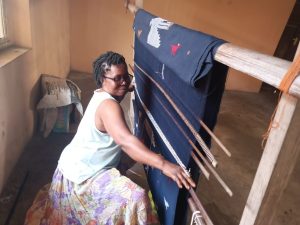
Similarly, Chief Okere believes any quantity of Akwete cloth could be manually produced by the army of Akwete women currently engaged in the weaving industry.
“This is something that every kitchen in Akwete does. Every woman is into it; right from the age of five every girl would have started learning how to weave. So, hundreds of thousands of pieces of Akwete cloth are produced here every month.”
The former Council boss also confirmed that patronage of the local fabrics is encouraging. Greater part of the patronage, according to him, comes from the neighbouring Rivers State, and Arochukwu people who use the cloth for their festivals. He also acknowledged Gov. Soludo as one of the key patronisers of the local fabrics.
“We have been receiving patronage from Gov. Soludo who places orders through his intermediaries. People from Rivers State also patronise our women a lot. Whatever ceremony they do in Rivers, they place orders for Akwete cloth.
“In Abia State, the Arochukwu people use Akwete cloth very well. They use it for their various festivals especially New Yam festival and Omu Aro festival. They book for it, and my wife who was a retired School Principal is involved in the booking because she is from Aro.
“We also get patronage from Ndigbo living abroad. Ndoki people in the US use Akwete cloth in making handbags, caps and shoes to promote our rich culture, and many people like using it too.”
Chief Okere suggested the establishment of a company using Akwete cloth to produce bags, caps and shoes in the ancient town. This according to him, will help to create more job opportunities for youths.
He further acknowledged the positive impacts of the weaving craft on Akwete women who he said, “support their families with the revenue from the business.”
“Weaving has helped our women indeed. A lot of them who are graduates today got to that height courtesy of this trade. We know it’s the occupation of the women alone but they use what they get from it to support their families.
Myth or marginalisation of men?
Chief Eruba who trained in Germany on Textiles at the beginning of the Nigeria civil war, regretted that Government had not supported the efforts towards full commercialisation of Akwete weaving craft. He noted that although the local women could churn out large quantities of Akwete cloth manually, introduction of machines would be an advantage for large scale production.
The German-trained Textile Designer had after his return to Nigeria set up a textile industry in Aba but the factory could not run as expected after about four years, and had to be shut down. Could the inability of the factory to thrive be as a result of apparent violation of the myth that Akwete cloth was a no go area for men, and for taking the craft outside Akwete soil?
Responding to the above puzzle, Chief Eruba said: “It was only a demonstration factory to make the weavers know there is the possibility of using half mechanised loom to make the Akwete cloth lighter than the thick one manually produced. It lasted for about 3-4 years because there was no enough patronage.
“Whether it was because men are not to go into weaving of Akwete cloth? I will say partly yes, because the people who were learning from my factory came from all over the place not just from Akwete. However, it taught the women how to make Akwete cloth wider in width than it was before. So, my achievement was that I made them know they could use broader loom.
“I also know that when some people chose to go to Lagos to teach the normal Akwete weaving, they all came back stranded. I don’t know why that happened.”
The puzzle therefore, remains: why was Akwete cloth factory not a success in Aba despite the commercial environment of the Enyimba City? If the craft still thrives in far away Akwete till date, why did it not succeed in Aba, more so when established by a foreign-trained professional?
Chief Eruba simply said: ” Yes I believe there is that cultural inhibition. But if there is any group that will undertake expansion, let it start the expansion here in Akwete, and improve on the women. Then the Akwete cloth can be produced by our women and used as raw material to produce other things. If Government wants to come in, let them begin the investment here and not outside Akwete land. The products can then be exported from here.”
Apart from the cultural myth, lack of vision by those in power to identify and encourage sectors with great prospect and multiplier effects has remained the bane of development especially in the South-East. Besides the late Premiere of the defunct Eastern Region, Dr Michael Okpara and few of his contemporaries, down to late Mbakwe, the successive and current crop of Igbos in political leadership, do not seem to have cohesion and focus.
Regrettably, majority of them rather seem to get obsessed with bogus and white elephant projects that have little or no bearing on the people. As long as it can swell their pickets, the people can roast for all they care!
Eruba regretted the demise of Mbakwe the only Governor that demonstrated interest in taking Akwete weaving craft to the next level.
“We have applied to Governments to help us scale up but no assistance. If people like the former Governor of the Old Imo State, Sam Mbakwe, were to be in power, such help would have come. It was only Mbakwe that built the existing weaving centre in Akwete. I led the efforts for that feat.
“We saw a small building where the women were using then as a cooperative centre, so, we met with Mbakwe and he asked if we needed a loan. But I asked him to give us a grant. So, he gave us N50,000 then (1980s), and we used it to erect that building.
“Outside that intervention, no other Government showed interest in developing Akwete cloth. When Col. Ike Nwosu was the Military Governor of Abia State, he tried to see what he could do to help us but he did not stay long in office before he was transferred to Oyo State.
On how to promote Akwete cloth, Chief Eruba suggested that the Abia State Government, should, in consultation with other South-East Governments, take conscious steps to patronise and project the fabrics to the outside world.
“When they unite to promote it, then the Federal Government will begin to listen,” he said, adding that “Akwete people alone cannot do it.”
He further said: “If Government can come and ask us to donate land where it will build a factory; and then say, let our women stay in it and weave their cloths and teach others, that will be fantastic!
“We need a weaving factory and good road. Everybody can see that our roads are not accessible. They are almost impassable!”
Still on the question on why men are not allowed to delve into weaving in Akwete, Mr Chidubem Ibegbulem, (a.k.a Hero of Africa), an Entertainer with three Guinness World Records, sees it as marginalisation against men.
“Dada Nwakata, a woman, was given the vision of weaving during her night sleep. She started the craft. It was an innovation from a woman, so, they restricted men from getting involved.
“Now, it’s a taboo here in Akwete for men to weave cloth. If they see a man doing it, they will come after him because their fear is that men may hijack the craft and their innovation from them. And men are afraid to dare them because you know women have a traditional way of placing a curse on anybody they see violating their rules.”
He, however, predicted bright future for the craft if given the necessary attention.
“It has great future because it is an art work, and the world recognises art and culture.”
Mr Onyema Onyekwere, 75, is a retired Principal of Abia State Senior Science School Ihie. He, also has no definite answer other than “tradition,” to why men are not allowed to venture into weaving in Akwete.
“We grew up here in our community and found out that men do not go into weaving. They do some other things like farming, fishing, hunting, trading, etc to earn a living. We asked questions but were told it was so from the beginning, and we have accepted it to be a norm.
Confronted with the fact that such traditional inhibition could be limiting the needed evolution in the weaving industry, he retorted: “We are in a traditional society and not everything can be challenged.”
Continuing he said: “Men had attempted to do it but…. Chief Okere Eruba attempted to set up a weaving factory in Aba instead of Akwete.“
Asked whether there were enough hands to manually produce large quantities of the local fabrics, he said the workforce could easily be mobilised among the women to meet any large scale demand.
The retired Principal also attested that weaving had made some positive impacts on the people of Akwete generally.
“We went to school with resources from weaving. I have my sisters and when they were young, they had looms in the house where they were weaving cloths. They used the resources in solving family needs. It also helped in training our children.
“Another great impact is that it helps in keeping our girls very busy and responsible. Youthful exuberance or ills are not completely absent in any human society but in Akwete, our girls are very responsible because they are occupied with a craft.”
The senior citizen further noted that the weaving craft in Akwete had permeated the neighbouring communities through marriages.
“Our daughters who get married there introduce to their new environment, and when we marry from outside, we teach them how to weave.”
He also, claimed that crime rate as well as promiscuity “is very low in Akwete because our girls have little or no time for indolence. Remember, it’s only the idle mind that the devil can rent as workshop.”
Mr Onyekwere also acknowledged the huge contributions of Akwete women in community development. “Our women built a Civil Centre for Akwete”, he thundered, giving credit to their ingenuity in weaving.
He, like others, advocated soft loan for Akwete women to boost their weaving craft. He also solicited that Government should expand the existing weaving centre to accommodate more girls willing to pursue a career in the industry.
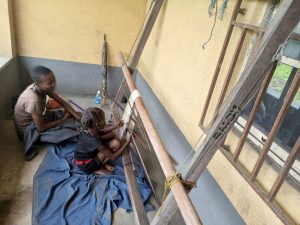
The current Secretary General of Ohanaeze Ndigbo Worldwide, and former Nigeria Consulate to South Africa, Ambassador Okey Emuchay, is from the neighbouring Azumini all in Ndoki clan of Ukwa East. He acknowledged the vital role the weaving craft plays in the economic empowerment of women of the area.
“Akwete weaving craft is part of our culture and tradition. Our women have been on it over the centuries. It occupies their time and generates employment for them and their families. It also keeps them at home
“We are very lucky they are still using the traditional loom to weave. Not much science/technology has gone into it, and it has not lost its originality.”
He, therefore, harped on the need for deliberate efforts by government and key stakeholders to promote it.
“It’s for us to continue to promote it. I wear it virtually at any public event to encourage other people to help in promoting it. Interestingly, the awareness is growing. Akwete cloth is what the Governor of Anambra State, Professor Soludo, wears in virtually every occasion. That’s the right way to promote our own. I urge other South-East Governors to emulate him.
“This is one of the ways to help promote our culture and assert our existence because people without culture are doomed. This is a veritable part of our culture and we will continue to sustain it.
Ambassador Emuchay also solicited Government assistance to the women including grants and loans. He noted that the women need financial assistance for mass importation of the thread they use in weaving.
Still on why the male folk are forbidden from the craft, the Ohanaeze Chief Scribe said: “It’s like in our place, women don’t climb palm trees. Why should it be an impediment? Men should face their own business. This is for women. There is no man I know who has ever set up a loom to say he wants to weave.”

In an interview, the Chairman of Akwete Women Co-operative Society, Mrs Hellen Ebere, said the women were fulfilled weaving but need Government assistance to expand the craft.
She regretted that apart from the only assistance from the late Gov. Mbakwe of the Old Imo State, successive administrations in the state had never looked their direction despite several promises.
“We have never received any loan or financial help from any Government except late Mbakwe who built the weaving centre for us. Government officials have been visiting us here but after each visit they make promises which are never fulfilled.”
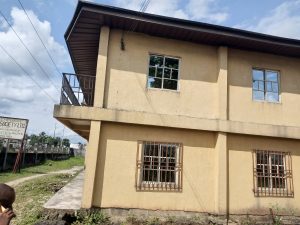
Asked to identify the major needs of her members, she said: “Our weaving centre has no light and needs to be lighted. There is no facility here except empty hall. So, it’s part of the reasons many women don’t like coming to the centre to weave. They prefer to stay in their homes to weave because they say it’s more convenient for them to weave at home.
“There is loom in every home in Akwete, and these women can get up as early as 7:00 am and start weaving. They can stay up till 10:00pm before ending for the day. So, it’s more convenient to do that at home. But if we have facilities to attract them to the centre, they will come.”
She, just like others, identified deplorable access road as a key challenge to the people. The retired teacher equally complained of low market ostensibly due to bad road.
“We don’t have enough market. Our women are ready to produce but the patronage is low. Before now buyers were coming from Aba and Port Harcourt waiting to buy our products but due to bad roads and high cost of transportation we don’t see them anymore except those coming to place orders.
“This has forced our women to take their products to Aba but the bad road is also affecting their movement, and nobody is ready for that stress again. So, if Government can come to fix our road, it will be a big relief.”
She, therefore, appealed for urgent Government intervention in the form of financial aid and infrastructural development. She specifically solicited the upgrading of the health centre in the ancient town to a hospital to effectively cater for the health needs of the people.
“We are tired of running the co-operative on our own. We need Government empowerment either as loan or grant. A loan of N300,000 for each of our members will be of immense help to us. According to her, the cooperative society has over 100 members.
“Our major basic needs include good road, light and financial assistance. But of serious importance is a good health facility. We don’t have hospital here. What we have is a health centre. If we have serious health issue we have to travel to Aba. Before someday gets to Aba under this bad road, the person would have been dead.”
Still on why the weaving craft is exclusively for women, she said it was a special way God wanted to empower Akwete women, adding that they want the myth respected.
“I was told and read from the books that you don’t teach it to another person except the natives or women married to Akwete. I don’t think it limits expansion because the craft is manually done. It doesn’t require machine. The art is ours.
“We know the art. Every community has a blessing from God. Our own blessing is weaving craft. That’s what God gave to us. If we teach others, what do we fall back on?”
She also said that weaving has been a blessing to Akwete women as it has enabled them to contribute meaningfully to Community development. She confirmed that Akwete women built a Civic Centre for the ancient town.
“I was trained with weaving and even though I am a retired teacher, I’m proud doing it. I’m very happy to have been born here, and for learning this craft. It’s a special craft.”
Nonetheless, she noted a decline in passion for weaving between the women of their generation and the young generation of girls in Akwete due to influence of education.
“The present day girls are losing interest in the craft because everybody wants to go to the university. During our time schools were few and everybody acquired the weaving skill. But now when those in the university graduate, not all of them like to come back here and continue with weaving. But during holidays they all come back to weave to make money. However, we still have enough women in the craft. All we need is Government support.”

On the high cost of thread which the weavers blamed on the rising exchange rate, the President, African Association for Small and Medium Enterprises, Ambassador Darlington Kalu, pointed accusing fingers at importers of textile materials who he accused of insincerity.
According to him, “the main reason it looks like the material scarce is because importers lie to Government on what they are bringing in. The Bill of Lading will indicate that they are bringing in thread to boost local textile industry while they will go and bring finished goods.”
“Textile is a contraband but the components of textile used for local production are not. So, we need to look at what importers said they imported to know if they tally with what is contained in the Bill of Lading. This is what is affecting the cost of threads because the available quantity is less than the demand.”
Soludo, poster boy for Akwete cloth
Meanwhile, Gov. Chukwuma Soludo of Anambra State has said that his patronage of Akwete cloth was borne out of his passion and resolve to promote home-made products even before he came to power. The Governor who spoke through his Chief Press Secretary, CPS, Mr Christian Aburime, said that his vision was to grow the economy through patronage of local products.
“Professor Soludo is not everyday politician; he is a statesman, and a leader who is not a boss. He is a visionary leader who always thinks about the future. Before he became Governor he told me he would be patronising Akwete cloth to encourage the women engaged in the craft. That’s the only way to empower the women and grow the economy. Apart from wearing Akwete cloth, he also wears shoes produced in Ogbunike, Anambra State.
“From his inauguration till today Gov. Soludo has always won Akwete clothes in his official functions. He is also encouraging those around him to wear Akwete cloth, and members of his cabinet including Aides all have it.
“Most of his official vehicles are Innoson vehicles. He is the first Governor to make it a policy. If you come to Government House Awka, you won’t see imported wine or Champagne. The most treasured drink here is palm wine.
“The Governor has always said it that you can’t go to Germany and see the German Chancellor drive any vehicle other than BMW. Foreign leaders patronise their own home made goods otherwise their government will not last.”
Aburime recalled how Gov. Soludo had during the just,-concluded South-East security and economic summit in Owerri, Imo State, in plain language, told his brother South-East Governors to begin to patronise home-made products. Soludo had also at the summit advocated a regional development plan for 50-100 years, to transform South-East economy.
On whether Gov. Soludo would want to intervene in some of the needs of Akwete people in addition to patronising their products, Aburime said the Governor was a philanthropist of note, and might show empathy if his attention were drawn to them.
“Outside politics, Soludo is a philanthropist. It’s not beyond what he can do if it’s brought to his notice,” he said.

When contacted on the efforts of his Government to address the identified challenges of Akwete cloth weavers, Abia State Governor, Dr Alex Otti, also said concrete and deliberate measures were being put in place to tackle them.
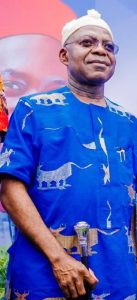
Gov. Otti who spoke through his Commissioner for Information, Prince Okey Kanu, said the Commissioner for Works had already been directed to include the Aba-Opobo Junction- Azumini-Ohambele-Obohia-Akwete Road in the on-going road renovation projects. According to him, palliative work would be done on the road in the weeks ahead to made it passable even though a federal road.
Otti who said he was among the passionate promoters of Akwete cloth added that Akwete women would be accommodated in the N10 billion he promised for Small and Medium Enterprises.
“Whatever plans Government has for SMEs is same for those into Akwete weaving craft. Government has initiated a cooperative project to bring in cooperative societies in the state into one basket.
“There is this N10 billion loan the Governor promised for SMEs during his campaigns and he is working towards that. One of his major focus is Akwete cloth.
“Governor Otti has also been wearing Akwete cloths to functions. The measurement of every member of the State Executive has been taken to make Akwete cloths for them. But we are going to do something more fundamental.
“Not just wearing Akwete cloths, we will engage the people in the weaving craft and give them support. We have conceptualised a project to build Akwete cloth gallery in Akwete and plans are ongoing in that regard. That gallery will be a tourist attraction where people will come and want to see how the cloth is made, and buy the products.
“If you see my walk-bag, it’s made with Adire but I have asked them to start making my own with Akwete cloth to promote our own.”
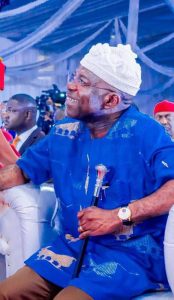
This Report is part of activities by the Ikenga Media & Cultural Awareness Initiative (IMCAI) under the Collaborative Media Engagement for Development Inclusivity and Accountability Project, a multi-level intervention for media independence and government accountability, managed by the Wole Soyinka Centre for Investigative Journalism (WSCIJ) and supported by MacArthur Foundation.

